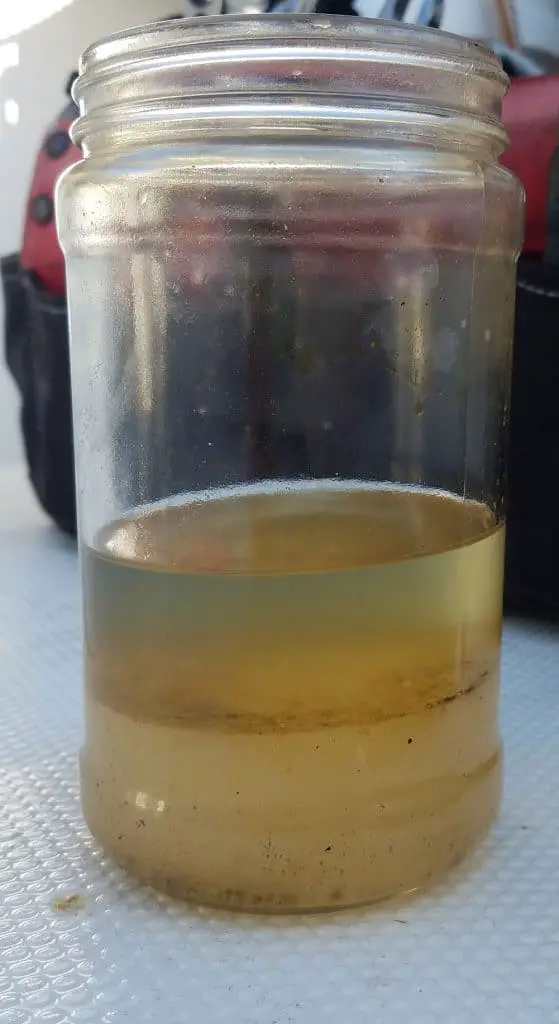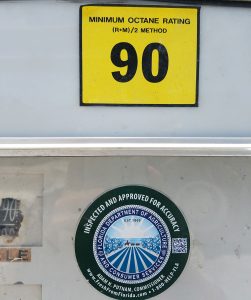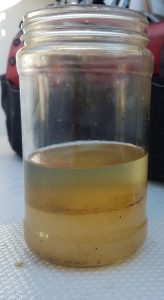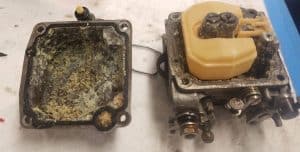A lot of boaters have sat at the fuel pump filling up their boat. Asking themselves, how much does it cost per gallon? Why is it so expensive? Why can’t I just use regular E10 Ethanol fuel in my boat?
Is It Ok To Use Ethanol Gas In A Boat? Yes! You can run ethanol fuel in a boat. Though it is strongly recommended that non-ethanol fuel be used. There can be damaging and costly effects done to the engine due to using ethanol fuel.
Here are all of the reasons why it is not recommended to use ethanol. As well as what you need to know if you are going to use ethanol in your boat.
What Is Ethanol Fuel? Marine Gas Vs. Regular Gas
A lot of people will say there isn’t much difference between marine gas and regular gas. That there is no harm to using one or the other. When there is really a huge difference! Ethanol is an additive that is used to mix with gasoline as a “renewable energy” source.
Ethanol is made from what is called “biomass.” This is produced by using corn or sugarcane to make it. Which makes it “renewable.” There is a couple of things that you want to know though.
It is basically a form of alcohol. Just like the alcohol in beer and liquor. The idea is that it cuts down on emissions and creates a renewable source of fuel.
There is a huge debate out there about whether or not it is an effective way of replacing gasoline and diesel. The emissions caused during its production. The effect it could have on food prices due to the loss of farm land.
So on and so on. It really doesn’t matter for what we are talking about here. The main point is that because we are adding an alcohol additive to the fuel, it changes how it affects the engine.
There is a misconception out there about how ethanol works when it comes to water.
Does Ethanol “Suck In Water From The Air”?
The idea is that ethanol will basically suck in water from the air. Which in turn adds water to the fuel and then creates what is called “phase separation.” We’ll talk about that in a minute.
There are two sides to this story. Most people believe that ethanol can draw in the moisture from the air.
Because ethanol is a hygroscopic substance, it will absorb water and add it to the mixture. So the debate that you will find is that some say it will suck the water in from the air. Others say that the condensation from the sides of the fuel tank introduces the water to the system.
I personally have not taken, (but have thought about doing this) a glass jar and filling it half way with ethanol blended fuel. Then letting it sit on the shelf at work for three months. Just to see what happens.
I’m not a chemist but from what it sounds like. The story of the moisture building up on the sides of the fuel tank as condensation, and then being drawn into the fuel. Sounds to be the most accurate.
We aren’t here to get into that debate. Some people can get pretty nasty about it, so we’ll let them work that out.
Our concern is the fact that because ethanol will absorb the water. It will then create what is called phase separation.
What Is Phase Separation?
This is where we run into problems. Phase separation is where the gasoline and ethanol blend separates. Leaving the pure gasoline on top of the ethanol blend.
Over time, the shelf life of ethanol-blended fuel is only 90-100 days since the blend was mixed. Which is also in “ideal” environmental conditions. Which is not that long of a time.
The problem occurs when the poor ethanol fuel is then introduced to the fuel system on the engine. Because it does not have the same combustible qualities as it once did. The engine might not be able to run!
This is all based on not having any kind of moisture or water introduced to the system though. All of us that have spent some time in the boating world. Know that there is no getting away from moisture and water. On a boat!
That’s why we invested into buying a boat! To be on the water! So there isn’t any, no moisture conditions. Water will always get into places you don’t want it to!
Fuel Testes state that it only takes one tablespoon of water per one gallon to contaminate and separate the fuel.
Regardless of whether or not it sucks the water from the air or absorbs the condensation from the sides of the tank.
Boat fuel tanks are vented. Which means that they are always open to the outside air conditions. Unlike our cars which have a closed fuel system.
So once the mixture has separated, it means that the gas is no longer burnable by your boats engine. Depending on the conditions. You might have a watery alcohol mixture that is sitting on the bottom of the tank. Just waiting to be sucked up into your engine and cause you all kinds of problems!
Now, your lawn mower or some small weed whackers might still be able to burn it for awhile.
But as far as the boat is concerned. It’s just going to be a problem.
Why Is Ethanol Bad For Boat Engines?
There is also one other thing that we need to talk about. That is the effect that the ethanol has on the rubber components in the engines fuel system.
Inside of the Engines FSM or VST, there are a lot of o-rings, gaskets, and rubber seals. Ethanol will speed up the process in eating these seals away. They will expand and contract them, as well as begin to rot them away!
This becomes a problem when you need to get into the FSM or the VST. If you do suck up some of that junk after phase separation happens. Then you will need to replace all of the gaskets and o-rings.
Instead of being able to just pull the thing apart, clean it out and put it back together. It is also important to note that if you do run on that low octane, watery, alcohol mixture during the phase separation phase.
Then this is hard on the fuel pumps and can eventually burn up a pump. Then when you turn off the engine and let it sit. It can become a problem.
If you are going to let the boat sit for an extended period of time. Then you don’t want that poor mixture sitting in the carburetors or the VST. It will be hard on the parts that are inside.
How Long Can Will Ethanol Gas Last In A Boat?
We talked about it a little bit earlier, but the fuel only has a shelf life of 90-100 days. Making it not something that you want to let sit. (Here’s an article about how to start an outboard that has been sitting.)
So making sure that you burn that fuel up, is extremely important. Even after all that we have talked about here today. These are just the things that you need to know about ethanol gasoline and using it in your boat.
Now having a little more knowledge about it. You are probably wondering if you can still use it or not. That would be a yes.
I know a lot of guys that still run their boats on regular gas from the fuel pump. The main thing about that is, that they run through that entire tank, within a week. They don’t let it sit.
If you want to run ethanol to save on the gas bill. It’s still not out of the question. Most of the people that I know that do run it. They will run 3-5 tanks of it. Then they will switch and run 1-2 tanks on straight REC 90 or non-ethanol fuel.
This way they don’t get a lot of build up in the tank. Kind of cleaning it out as they go.
Then if you are going to store the boat. Make sure you fill up the last couple of fills on the non-ethanol. Making sure you have good fuel left in the system when you put the boat away for storage!
Can You Save The Old Ethanol Gas In Your Boat With Additives?
You just don’t want to have any ethanol blend in the fuel tank if it is going to sit for longer than three months. Which will leave you with that phase separation problem to deal with the next time you get the boat out.
Bringing me to one last thing you should be aware of. There is absolutely NO PRODUCT on the market that can fix or stop phase separation. You can not take phase separated fuel and add something to it, making it good fuel again.
There are tons of products out there that you can buy. I will tell you this, for a $20 can of fix your mistake. It will end up costing thousands when the fuel system needs to be cleaned, and the injectors aren’t operating properly.
It’s best to cut the loses when phase separation happens. Pump that gas out, and start fresh.
You shouldn’t have any problems after reading this article though. You know better than to let this happen to you!
Check Us Out!
Hopefully, you will take the advice and keep your boat running great! Avoiding all the nightmares that happen when stuck with phase-separated ethanol fuel in your boat.
If you’ve got any questions or comments, let us know by subscribing to our YouTube Channel!
And if you would like to support us to continue bringing you great content, please click the link below to Amazon where we get a commission from anything you are already going to buy!
Click Here To Amazon!
And you can also donate by clicking the donate button here or on the right hand of the screen!
It really helps us out and we thank you so much for your support!
Thanks for reading and we look forward to reading your responses and comments.
We’d like to invite you to come and check us out on our Youtube Channel: Born Again Boating! We make all kinds of how to and DIY boating videos.
Along with a bunch of in-depth outboard service tutorials!
Get subscribed to the channel and add us to your favorites so we can become your go-to resource when it comes to completing all of your DIY boating projects!





